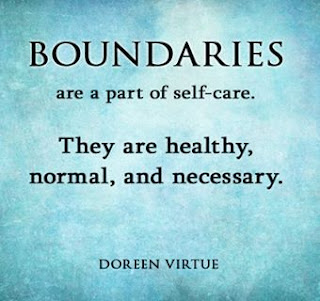Boundaries is a term popularized by Drs Henry Cloud and John
Townsend in 1992 with their bestselling book, Boundaries: When to Say Yes, How to Say No to Take Control of Your Life. A boundary is defined as an invisible line which helps us
define ourselves and our responsibility. It has become a popular concept which
helps individuals recognize where they begin and end. This boundary line helps
guard our hearts and souls as Proverbs 4:23 says “Above all else, guard your
heart, for it is the wellspring of life.” A line which helps us define who we
are as an individual and who others are. It helps us define what we are
responsible for and what we are not. It is a line which allows others to
understand which behaviors are acceptable and which ones are not. Below is a
brief overview of boundaries, the types of boundaries and how boundaries work.
Boundaries help keep the good in and the bad out. There are
different types of boundaries. First, physical boundaries. Who we allow to
touch us physical and who we don’t is a physical boundary. Our physical
location is also a boundary. Living in a different location from someone who is
a toxic or unsafe person is a boundary. Proverbs 22:3 says “the prudent man
sees the evil and hides himself.” Second, our words are boundaries. The most
basic boundary setting word is no. “No, I will not participate.” Our words help
others understand where we stand. For example, “Yes, I like to that” and “No, I
don’t like this.” Third, time is a boundary. How much time we are willing spend
with people is a boundary. Sometimes we need time apart from others in order to
reenergize. Even Jesus took time for himself: to prepare for major tasks (Luke
4:1-2), to recharge (Mark 6:30-32), to grieve (Matthew 14:1-3), in times of
distress (Luke 22:39-44) and prayer (Luke 5:16). Lastly, emotional distance is
a boundary. It is defined as who we trust and who we do not. Unfortunately,
sometimes we need our trust to be broken before we learn who is trustworthy and
who is not. It is a lesson that often repeats itself as new people enter our
lives.
According to Cloud and Townsend, there are 10 Laws of
Boundaries. I will discuss a few of them. First, the Law of Sowing and Reaping.
This is the cause and effect of our behaviors, feelings and reactions to the
world around us. Galatians 6:7-8 tells us that we reap what we sow. If we sow
to please our sinful nature, then we will reap destruction. However, if we sow
to please the Spirit, then we will reap eternal life. Second, the Law of
Respect states that if we command our boundaries to be respected, then we need
to respect the boundaries of others. A great example is if a teenager is
requesting the boundary of privacy, then he or she needs to respect the needs
of privacy of his or her parents. Third, the Law of Proactivity states that we
need to be proactive with our boundaries. We need to communicate when a
boundary has been violated quickly rather than letting it fester until we
explode. Proactive people can live their rights not just demand them. For
example, a proactive person will be respectful in order to be respected. They
don’t “return evil for evil” (1 Peter 3:9). Fourth, the Law of Activity goes
along with the Law of Proactivity. In this law, boundaries are made and
maintained by being active. We need to enforce and reinforce the boundaries.
Lastly, the Law of Exposure. We need to make our boundaries visible and
communicated to others so they can respect them. We need to remind individuals
where those limits are.
There are a few myths about boundaries that I want to
discuss. First, boundaries are selfish. There is a distinction between
selfishness and stewardship. Selfishness is focusing on our own wishes and
desires while ignoring our responsibilities. Stewardship is protecting us by
saying “no” to people and activities that could be harmful to us. Having wishes
and desires is given to us by God, according to Proverbs 13:4; however, we are
to keep them in line with healthy goals and responsibility. Second, boundaries
are a sign of disobedience especially within the Christian community. A common
statement is “Your unwillingness to go along with our program shows an
unresponsive heart” (Cloud and Townsend, 1992). However, the lack of boundaries
is a sign of disobedience. When people have no boundaries are often compliant
on the outside, but resentment builds on the inside. Third, boundaries cause
harm. Cloud and Townsend has three myths dealing with boundaries and harm. I
have combined them into one. Boundaries help protect us from harm. When
boundaries are used properly, they are a tool of defense, they are not a tool
of offensive in order to attack or wound someone. Inappropriate or bad boundaries can hurt us.
However, when good boundaries are in place, they can help us toward maturity
and responsibility. Lastly, boundaries are permanent. When a boundary is
respected, it can be renegotiated later. They can be as flexible and fluid as
you want them to be if they are respected. However, some boundaries can be
rigid and firm for safety’s sake.
In conclusion, boundaries are often a litmus test for the
quality of our relationships. When someone hates when we say “no” and only
wants our “yes,” and doesn’t respect the boundaries we put in place, then the
relationships are not healthy. Boundaries are about respect. Boundaries need to
actively and proactively maintain to avoid others’ violating them. Boundaries
are as flexible or rigid as you wish. I have only glanced over the in-depth
topic of boundaries. If you wish to learn more, I highly recommend Boundaries by Drs. Henry Cloud and John
Townsend. They will cover everything in depth and boundaries with the different
types of relationships in your life.













